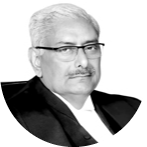Arunachal Pradesh President’s Rule
Nabam Rebia v Deputy Speaker
The Supreme Court settled the question of governor's discretion and the 'scope' of judicial review over governor's functions.
Decided
Parties
Appellants: Nabam Rebia, Bamang Felix
Lawyers:
Respondents: Tenzing Norbu Thongdok
Lawyers:
Case Details
Case Number: CA 6203-6204/2016
Next Hearing:
Last Updated: December 5, 2023
TAGS: Disqualification, Federalism, Floor Test, Governor, Parliament
Key Issues
What is the scope of Governor’s discretionary power under Article 163(2)
Does the Governor have “discretionary power” with respect to functioning of the State Legislature in matters concerning summoning of the session, removal of the speaker and proceedings of disqualification under Xth Schedule?
Is the Speaker’s act of deciding on disqualification petitions under Xth Schedule when a petition for his removal is pending before the House constitutionally permissible?
Case Description
Arunachal Pradesh experienced a constitutional crisis between November 2015 and March 2016. The Indian National Congress (INC) held the majority in the House with 47 members out of the total house strength of 60 members. The Opposition included 11 members belonging to the Bharatiya Janata Party (BJP) and 2 independent members. The constitutional crisis began when 21 MLAs of the Congress party rebelled against the formed government. Backed by Opposition members, the rebel MLAs demanded the removal of Chief Minister Nabam Tuki and Speaker Nabam Rebia.
The Speaker on December 15th 2015 disqualified 14 of the rebel MLAs—a decision subsequently quashed by the Deputy Speaker on the same day. Meanwhile, Governor Rajkhowa advanced the Assembly session to December 16th, 2015. The Tuki government stated that such advancement was illegal and locked the session. The MLAs met in a community hall instead. Here, in the presence of only 33 MLAs present in the hall, speaker Rebia was removed from his position. On the very next day, CM Tuki was voted out of his position. Kalikho Pul was then installed as the new Chief Minister. Speaker Rebia then moved the Gauhati High Court to challenge the advancement of the Assembly and all subsequent events.
The Gauhati High Court ruled that neither the Governor’s discretion nor the proceedings of a Legislature can be challenged in a court of law under Articles 163 and Article 212 of the Constitution. As a consequence, the Court held that the actions of the Assembly and the Governor had been entirely within the law.
Following this, Speaker Rebia appealed to the Supreme Court. Speaker Rebia appealed that the Governor’s act of interfering in the functioning of the State legislature fell outside the scope of Article 161 and Article 163(2).
A five-judge bench—Justices J.S. Khehar, Dipak Misra, M.B. Lokur, P.C. Ghose, N.V. Ramana—unanimously held that the powers of the Governor are not absolute. They ordered that the Speaker cannot disqualify members when a motion of removal is pending against him.
On May 11th, 2023, a 5-judge bench led by Chief Justice D.Y. Chandrachud referred this judgement to a 7-Judge Constitution Bench for reconsideration.




